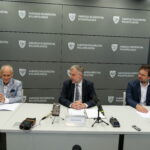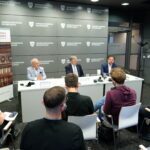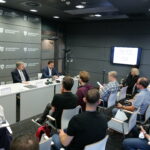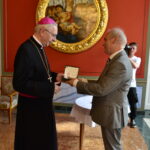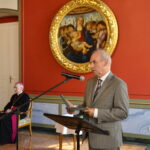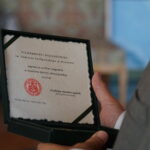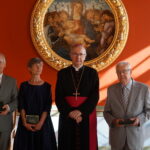The Centenary of the Birth of Stanisław Wisłocki
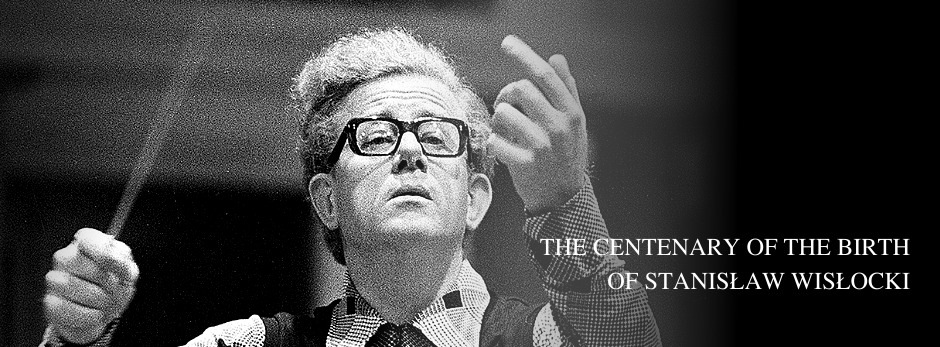
He was born a hundred years ago – on the 7th of July 1921 in Rzeszów. A magnificent conductor, composer, pianist and pedagogue. He went down in the history of Poznan in a special way when in 1947 he formed Poznan Philharmonic Orchestra and held the position of its first conductor and artistic director of the Philharmonic until 1958.
That’s what he wrote about his work in Poznan in the book “Life of one musician”:
“In the first work period with the orchestra I placed the greatest emphasis on the classical repertoire, as it’s the best one to even out the sound. (…) Then we worked on the music of romanticism, neo-romanticism and the 20th century, including Polish contemporary music. After the orchestra have reached a significant level of technical advancement, we increased the number of Polish premieres. The Polish Composers’ Union often trusted us with organizing the auditions of new works. Thus close to the Philharmonic’s fifth anniversary we could talk about achievements on a national scale.”
Wisłocki was memorialized in Poznan, along with his wife Izabella, on of the tenement houses of the North frontage of the Old Market Square. On the frieze under the second floor’s windows of number 88 Julian Boss-Gosławski placed the images of the architect Izabella Wisłocka, who designed the reconstruction of the majority of tenements at this part of the Square, and her husband Stanisław Wisłocki, who back then was the artistic director of Poznan Philharmonic.
Poznan Philharmonic Orchestra will play the concert dedicated to the memory of Stanisław Wisłocki under the baton of Antoni Wit on the 13th of November this year. The program includes Piano Concerto by Stanisław Wisłocki in the interpretation of Krzysztof Książek.
Exceptional place, exceptional music and exceptional atmosphere… It must be Kloster Chorin in Brandenburg and the annual summer music festival, Choriner Musiksommer. Poznan Philharmonic Orchestra are regular guests there.
The festival is held in the walls of the picturesque post-cysterian abbey, partially ruined. The unusual scenery and the acoustics of this place is well-known to visitors of the local artistic events. Today we present a few photos from our concert which took place on Saturday, the 3rd of July. It is a souvenir for those, who spent last Saturday in Chorin, and a short impression for those, who couldn’t be there…
In Chorin Poznan Philharmonic Orchestra and Tomasz Daroch (cello), led by Łukasz Borowicz, performed the Overture to the Opera “Castle of Czorsztyn” by Karol Kurpiński, Cello Concerto in C major, Hob. VIIb/1 by Joseph Haydn and Symphony No. 1 in G minor by Étienne Nicolas Méhul.
Due to pandemic restrictions the concert was held twice. Both performances were greatly applauded by the audience which led to encores.
Below we publish the review of the concert by Poznan Philharmonic Orchestra which came out in Märkische Oderzeitung.
Poznan Philharmonic Orchestra charms at the Festival of Classical Music in the cloister
Kurpiński, Haydn or Méhul – Poznan Philharmonic Orchestra attracts the audience of Choriner Musiksommer with belligerent sounds and a greatly joyful play.
An overture, as befits, opens a conventional concert program or a dramatic and musical work. The Overture to the Opera “Castle of Czorsztyn” by Karol Kurpiński from 1819 stands for both variants. On Saturday Poznan Philharmonic Orchestra began with it the guest performance at the 58th Choriner Musiksommer.
The Polish composer’s work musically fluctuates between the classical and the romantic era. It is an exhilarating summary of a rather banal plot with a dose of horror, fainting and the joy of reunion. After a dramatic opening cheerful expectation and tones filled with buoyant elegance appear, followed by imminent resentment and a multitude of aggregated conflicts. Poznan Philharmonic Orchestra conducted by Łukasz Borowicz presented this range of emotions with an entrancing engagement.
Cello Concerto No. 1 in C major by Joseph Haydn with Tomasz Daroch at the solo part, the playful virtuosity of which captures from the first movement (Moderato), vibrates with playful lightness. Adagio spreads a truly musical mood and comfort which resembles casual singing on the strings. The bright tone of the superbly prepared “accompanying ensemble” also supports the Allegro finale in the roaring and dynamic performance. The pure joy presented by the musicians in their play was appropriately applauded.
With equal commitment they interpreted the fascinating music of the Symphony No. 1 in G minor by Étienne Nicolas Méhul, an important composer from the period of French Revolution. Ludwig van Beethoven was very stirred by his concentrated energy, it was even reflected in his opera “Fidelio”. The Frenchman’s G minor also echoes Haydn and Mozart. The initial part is sinister, full of conflicts and gripping. While the rich variations of the succeeding Andante have contemplative character, the humorous Allegro moderato pizzicato provides delightful diversity. Poznan musicians effectively trail the refinement of the orchestral sound until the energetic finale.
The fact that the listeners and musicians can now have direct aural and visual contact and the invisible currents of energy between them flow once again is one of the hopeful impressions from the concert afternoon in the Chorin cloister, which was also pleasant thanks to the weather conditions.
Peter Buske
Märkische Oderzeitung
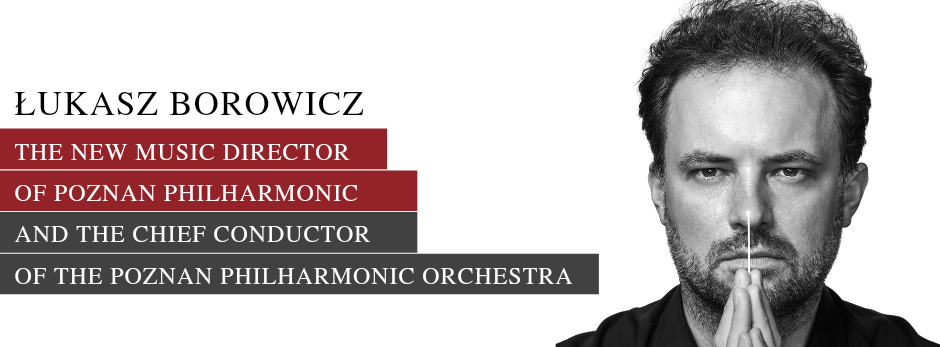
Marek Woźniak, the Marshal of the Wielkopolska Region, presented the new chief musical director on the Friday press conference.
– ‘We have got together to officially announce magnificent news concerning the new season of the Poznan Philharmonic. Along with its beginning the position of the music director – chief conductor of the Poznan Philharmonic Orchestra will be taken up by Łukasz Borowicz, who has been cooperating with our Philharmonic for many years through great concerts and recordings’, said Marek Woźniak. ‘We are extremely happy that among many other interesting proposals Łukasz Borowicz has chosen Poznan. For us it means high quality of the artistic offer.’
– ‘When years ago I talked with Kazimierz Kord, one of the greatest Polish conductors, he told me that you could count on one hand the number of conductors who have “sound in their hands”. Łukasz Borowicz was one of them’, recalled Wojciech Nentwig, the Director of the Poznan Philharmonic. ‘I took his advice and we outreached Łukasz Borowicz’.
Wojciech Nentwig also presented the outline of the new 75th artistic season of the Poznan Philharmonic. A galaxy of prominent soloists and conductors will appear not only on the stage of the AMU Concert Hall, the auditorium of Poznan Philharmonic, but also out of Poznan, along with the Poznan Philharmonic Orchestra. On the 11th of September, the 20th anniversary of the attack on the World Trace Center, for instance, in the Church of Peace in Świdnica Rafał Blechacz will perform, accompanied by Poznan Philharmonic Orchestra – it is his only concert with an orchestra scheduled in Poland this year.
During the conference Łukasz Borowicz shared his vision of conducting and working with an orchestra. He also highlighted the role of Poznan as a philharmonic center on the musical map of Poland and Europe.
– ‘Poznan Philharmonic is a globally recognized brand. We know from artists and their agents that those who come here, wish to return – because of the orchestra, the audience, the atmosphere accompanying their performances’, said Łukasz Borowicz. ‘The tough pandemic times we have survived strengthened us by dealing with numerous artistic challenges and overcoming barriers we had no idea of. For me the most important thing is that in the Poznan Philharmonic I can make my dreams come true: I have been doing it, along with the orchestra, uninterruptedly since 2006, since the memorable concert with Ida Haendel.’
The day before the celebrations of the feast of the Saint Apostles Peter and Paul, patrons of the Poznan cathedral, in the archepiscopal residence a prize-giving ceremony of the Archbishop of Poznan’s Award was held to honour remarkable achievements in the field of Christian culture. Poznan Philharmonic was among this year’s laureates.
On the invitation of the Poznan Philharmonic, the ceremony was graced by the performance of Andrzej Wierciński, a young pianist preparing for this year’s edition of the Chopin competition in Warsaw who played Ballade in F minor, Op. 52 by Frédéric Chopin.
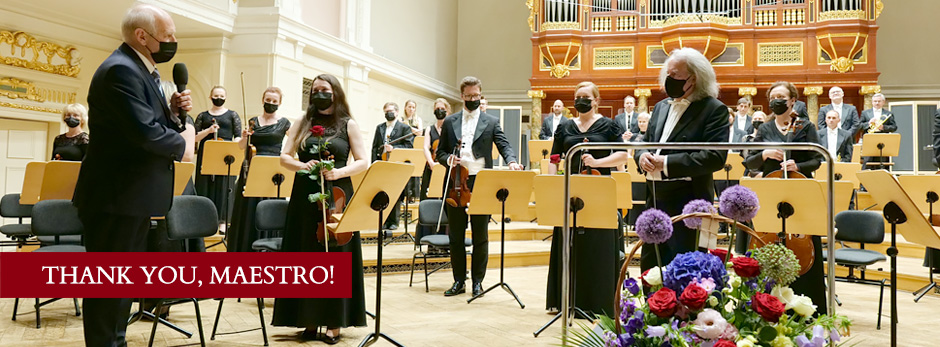
Fourteen years have passed like one day…. Has that thought run through the head of Maestro Marek Pijarowski when on Friday evening, on the 18th of June, he raised the baton for the last time at the end of the magnificent Italian Symphony by Felix Mendelssohn? The concert he led that day, closing the 2020/2021 artistic season of the Poznan Philharmonic, was also his jubilee concert which crowned the 50th anniversary of artistic work and the 70th birthday anniversary of the Maestro (hence the concert’s title: “Maestro”). It was also the last time he appeared on the stage of the AMU Concert Hall as the Chief Conductor of the Poznan Philharmonic Orchestra. Thus there were many emotional moments and occasions for acknowledgments.
Marek Woźniak, Marshal of the Wielkopolska Region, Wojciech Nentwig, Director of the Poznan Philharmonic and Radosław Komolka, Inspector of the Poznan Philharmonic Orchestra thanked Maestro for his excellent work in the past seasons (Marek Pijarowski was the Chief Conductor from 2007/2008 artistic season to 2020/2021). The Marshal and the Director also expressed words of gratitude to the conductor for lending a helping hand to the Philharmonic and the orchestra years ago, when they were going through a tough time.
Meanwhile Maestro spared no warm words towards the orchestra and thanked it for the most wonderful years he had spent with it. He also recalled the beginnings, when Wojciech Nentwig, freshly minted Director of the Poznan Philharmonic, called him with an appointment proposal. They met in Wroclaw.
‘I listened to him envisioning the development of the Philharmonic and I thought: what a lunatic!’, said Marek Pijarowski from the stage. ‘I kept listening and… I got more and more involved, so I thought: maybe two lunatics? And so it began…’
There were gifts, flowers, even a cake baked for Maestro especially by one of the orchestra’s violinists. There were thanks and compliments. And the promise, the most important one for the music lovers: we do not say “goodbye” to Marek Pijarowski, but “see you soon”. In the next artistic season he will appear on the stage of the AMU Concert Hall as the Guest Conductor.
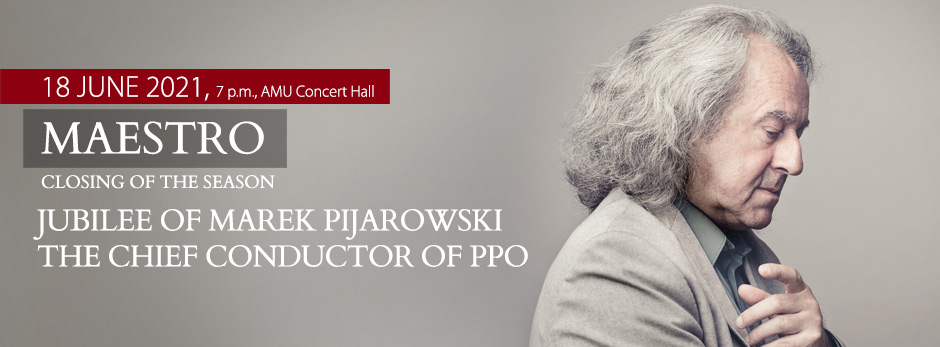
The closing concert of the artistic season 2020/2021 in Poznan Philharmonic (held on Friday, the 18th of June at 7 pm, AMU Concert Hall) will be filled with the music from the Romantic period. Marek Pijarowski, the chief conductor of the Poznan Philharmonic, who celebrates this year both the 50th anniversary of his artistic work and his 70th birthday anniversary, would be the man of the hour.
Cello Concerto in A minor, Op. 33 by Camille Saint-Saëns is one of the most prominent works of that genre, though it is not performed as often in the philharmonic halls as the cello concertos by Antonín Dvořák, Robert Schumann or Joseph Haydn. Saint-Saëns wrote it in 1872 for an outstanding Belgian cellist Auguste Tolbecque who played the piece for the first time in January 1873 in Paris Conservatoire. The next cello concerto by that composer hasn’t been written until 30 years later – in 1902. Though it was a typical virtuoso concerto, it has never met with the success achieved by the first one, which is attributed to the high level of the performance issues.
The most popular symphonic work by Felix Mendelssohn-Bartholdy is his Symphony No. 4 in A major, Op. 90, known as “Italian”. He wrote it at the age of 24 and the music clearly illustrates the echoes of his trip to Italy. It reflects Italian landscapes, culture, the country’s heritage and its inhabitants like a mirror. In the letter to his parents the young composer wrote about the joy that filled his heart, while in the letter to his sister he confided that the Italian symphony would be the most cheerful work he had ever written. This is how the unusually exuberant and energetic musical piece originated.
PERFORMERS:
Tomasz DAROCH – cello
Marek PIJAROWSKI – conductor
Poznan Philharmonic Orchestra
Jakub Kasperski – introduction to the concert
PROGRAM:
- Camille Saint-Saëns, Cello Concerto in A minor, Op. 33
- Felix Mendelssohn-Bartholdy, Symphony No. 4, Op. 90 “Italian”
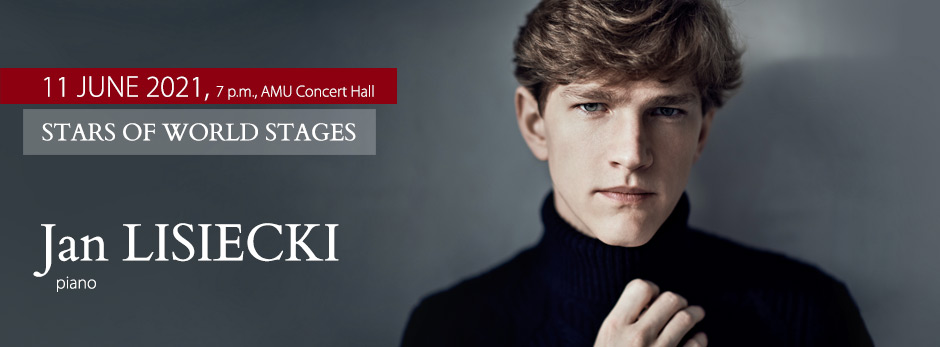
The hero of the Stars of World Stages cycle concert (11th of June, 7 pm, AMU Concert Hall) is a well-known to the audience of the Poznan Philharmonic (and very liked) Jan Lisiecki – Canadian pianist with Polish (and Poznan!) roots. The Poznan Philharmonic Orchestra will be led by Łukasz Borowicz.
The evening will start with Symphony No. 1 in G minor by Étienne Nicolas Méhul, the greatest French composer from the times of the French Revolution. He used to write mainly operas, but his works also include patriotic and propaganda songs from this anxious period. His music reflects the dramatic tension of the revolutionary events and the Napoleonic era. Mehul was then an important figure of the Parisian artistic life, one of his friends was Napoleon Bonaparte.
Considered the first French composer of the Romanticism movement, he is also recognized as the progenitor of the development of French symphony. His Symphony No. 1 originated in the same year as Ludwig van Beethoven’s Symphony No. 5 (1808). Nowadays both works are often compared with each other.
Piano Concerto No. 1 in G minor, Op. 25 by Felix Mendelssohn-Bartholdy was composed in the years of 1830-31. The premiere performance took place in Munich in October 1831, with the composer at the piano, who was also a superb (and enjoying undisputed fame) pianist. During the concert two other works of the composer were presented: Symphony No. 1 and Overture to “A Midsummer Night’s Dream”.
The piece was written in Rome during the composer’s trip to Italy. It originated roughly in the same period as his famous Symphony No. 4 in A major “Italian”. One could say that the travel experiences from traveling through Italy spurred his fantasy and became reflected in the works inspired by them.
PERFORMERS:
Jan LISIECKI – piano
Łukasz BOROWICZ – conductor, host
Poznan Philharmonic Orchestra
PROGRAM:
- Étienne Nicolas Méhul, Symphony No. 1 in G minor
- Felix Mendelssohn-Bartholdy, Piano Concerto No. 1 in G minor
Partner:
 |
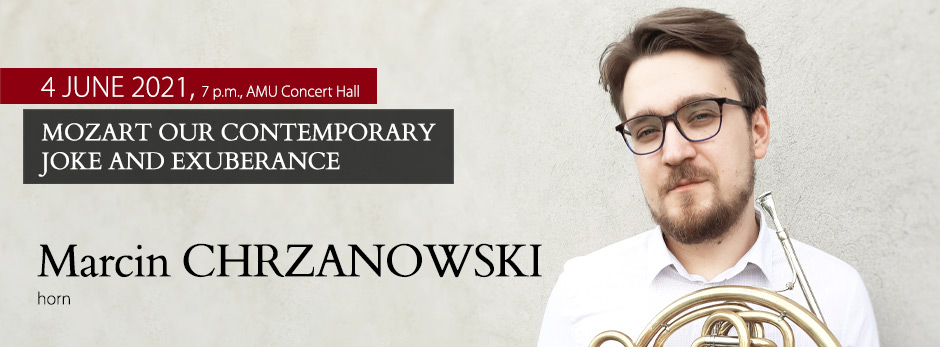
Poznan Philharmonic would like to invite you to AMU Concert Hall on Friday, 4th of June at 7 pm, for another concert from the cycle ”Mozart Our Contemporary”, this time entitled ”Joke and Exuberance”. The evening will be filled with music by Wolfgang Amadeus Mozart.
The concert will be opened by the well-known and liked Overture to ”The Marriage of Figaro”. The short piece evolves in a stunning presto, which can never be too fast, as Mozart himself used to say. Curiously enough, this exuberant work doesn’t use any opera excerpts – it’s an autonomous piece which perfectly introduces into the mood of the opera.
Four horn concertos written by Mozart in the years of 1782-1786 currently form a basic repertoire for that instrument. Suffice it to say that in the recent years forty percent of all horn recordings are Mozart concertos.
Mozart composed all of them for his friend, horn player Ignaz Leutgeb, member of the court chapel in Salzburg and a distinguished soloist. The friendship between Leutgeb and the Mozart family is underlined by the fact that the big cheese factory he opened after his relocation to Vienna could be established thanks to a generous loan made by Leopold Mozart, Wolfgang’s father.
Although the manuscripts of the concertos show various epithets added by the composer and addressed to Leutgeb, they were more the effect of the exceptionally close ties of friendship between the composer and the horn player than the willingness to tease the instrumentalist. Maybe the fact that the Horn Concerto No. 4 was written alternately in black, red, blue and green ink was an expression of a specific joke?
Symphony No. 40 in G minor, KV 550, is completely different in character from other Mozart’s works. It’s one of two Mozart symphonies written in minor (first one, also in g minor, has number 25). The composer completed it in two months, in the summer of 1788. That year he also wrote two other symphonies: in E-flat major (KV 543) and C major (KV 551) – all three of them were the last ones to be composed. It is not known whether Symphony No. 40, also known as ”Great”, was performed during the author’s lifetime. He was not in the greatest shape while writing it. In a letter to his wife he wrote: ‘if people could look inside my heart, I would be embarrassed. I feel as if everything around me is cold as ice.’ From all Mozart’s works this one till today has been most frequently subject to countless analyses and interpretations.
Friday, 4th of June 2021, 7 pm, AMU Concert Hall
MOZART OUR CONTEMPORARY
JOKE AND EXUBERANCE
PERFORMERS:
Marcin CHRZANOWSKI – horn
Łukasz BOROWICZ – conductor, host
Poznan Philharmonic Orchestra
PROGRAM:
Wolfgang Amadeus Mozart:
Overture to “The Marriage of Figaro”
Horn Concerto No. 4 in E-Flat Major, KV 495
Symphony No. 40 in G minor, KV 550
Season tickets: DL | SG | MW
Tickets: price A
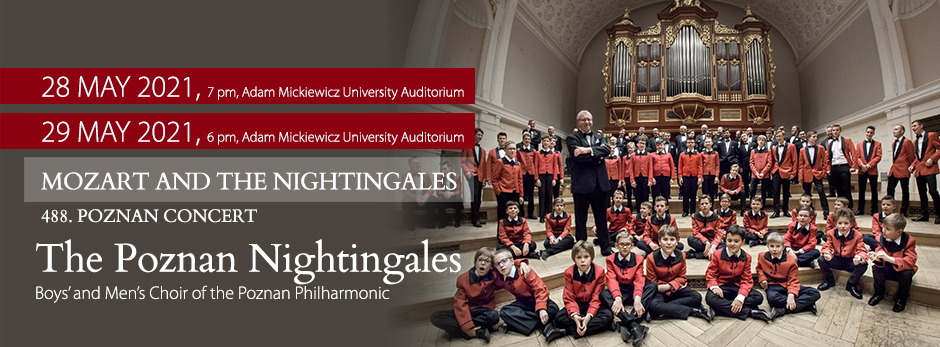
Well-known and cheerful works by Wolfgang Amadeus Mozart will fill both evenings of the two editions of the 488th Poznan Concert. They will be performed in AMU Concert Hall by the Poznan Nightingales, a galaxy of soloists and Maciej Bolewski on the organ, under the baton of Maciej Wieloch, on Friday, 28th of May at 7 pm and on Saturday, 29th of May at 6 pm.
“Sancta Maria, mater Dei”, a piece written by Mozart at the age of 21 in 1777, shortly before he left Salzburg, to celebrate the Nativity of Virgin Mary falling on the 8th of September, will open both evenings.
Following work is short, yet unusually emotionally rich “Laudate Dominum” from “Vesperae solennes de confessore”, and next “Te Deum”, presumably written at the end of 1769 in Salzburg. As it was modelled on “Te Deum” by Michael Haydn (brother of Joseph Haydn), composed 9 years before, for a time there were doubts whether Mozart was really the author. It wasn’t until the discovery of the voice parts of “Te Deum” in the archives of Salzburg Cathedral that all the doubts were dispelled.
The concerts will end with “Ave verum corpus” and Coronation Mass in C major – one of the most frequently performed Mozart’s sacred works. The Mass, written for the coronation celebrations of the miraculous painting of Virgin Mary in the pilgrimage church Maria Plein near Salzburg, is a dense and great sounding piece.
Friday, 28th of May 2021, 7 pm, AMU Concert Hall
Saturday, 29th of May 2021, 6 pm, AMU Concert Hall
488. POZNAN CONCERT
MOZART AND THE NIGHTINGALES
PERFORMERS:
Monika MYCH – soprano
Małgorzata WOLTMANN-ŻEBROWSKA – alto / mezzosoprano
Damian ŻEBROWSKI – tenor
Andrzej OGÓRKIEWICZ – bass
Maciej BOLEWSKI – organ
Boys’ and Men’s Choir of the Poznan Philharmonic The Poznan Nightingales
Maciej WIELOCH – conductor
PROGRAM:
- Wolfgang Amadeus Mozart:
“Sancta Maria, mater Dei” KV 273
“Laudate Dominum” from “Vesperae solennes de confessore” KV 339
“Te Deum” KV 141 / 66b
“Ave verum corpus” KV 618
“Coronation Mass” in C major KV 317
Season tickets:
KP 1 (28.05)
KP 2 (29.05)
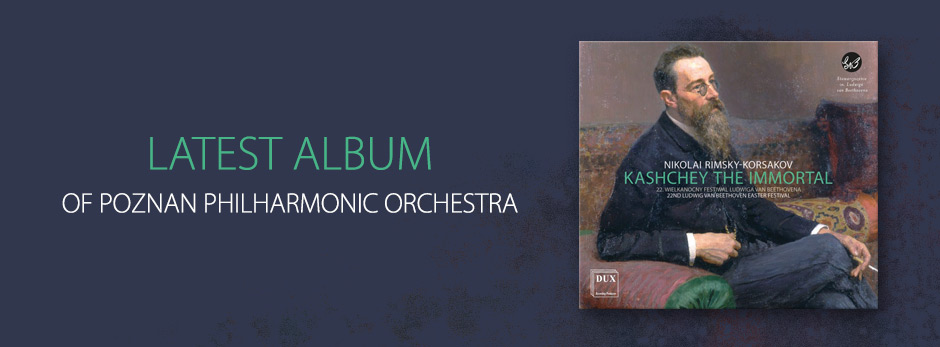
The latest album of Poznan Philharmonic Orchestra, “Kashchey the Deathless” by Nikolai Rimsky-Korsakov released by DUX label, can now be purchased in good music stores.
Unknown in Poland one-act opera “Kashchey the Deathless” by Nikolai Rimsky-Korsakov was recorded in the concert version during the 22nd Ludwig van Beethoven Easter Festival in Warsaw (as part of the cycle “Unknown Operas by Well-Known Composers”) by Poznan Philharmonic Orchestra, Poznan Chamber Choir (prepared by Bartosz Michałowski) and the soloists of the Mariinsky Academy of Young Opera Singers in Petersburg (Savva Khastaev [Kashchey / tenor], Antonina Vesenina [Tsarevna / soprano], Irina Shishkova [Daughter of Kashchey / mezzosoprano], Yaroslav Petryanik [Prince Ivan – Korolevich / baritone], Mikhail Kolelishvili [Storm-Bogatyr / bass]). The piece was led by Łukasz Borowicz.
Nikolai Rimsky-Korsakov’s work is a fairy-tale opera about an evil kingdom of Kashchey, which to the people of that time seemed to be a metaphor of tsarism. Suffice it to say that its premiere performance in Moscow in 1902 incited a riot with participation of a revolutionary crowd. The effect was unintended by the composer, though it pleased his progressive heart.
The opera received a subtitle “A Little Autumn Fairy Tale”, which indicates an analogy with “The Snow Maiden” – a spring fairy tale, but clearly suggests different emotions, since the story is rather somber. Its action takes place in the kingdom of Kashchey – a repulsive old man who kidnapped and imprisoned in his palace beautiful Tsarevna, who dreams about her beloved Prince Ivan. It’s not only the old man who is standing in the way of their happiness, but also his evil daughter. After successive twists and turns, as it often happens in fairy tales, everything ends well – the wicked old man dies, the daughter of Kashchey turns into a weeping willow and the gloomy kingdom becomes a land of sun and happiness.


